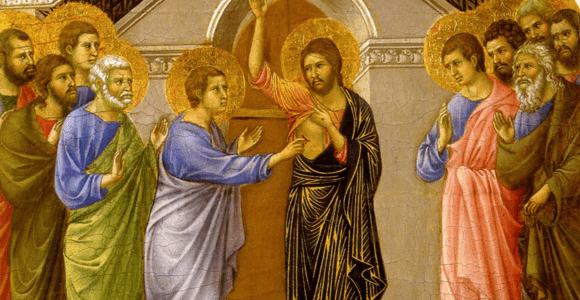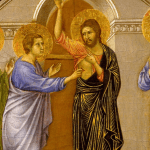
Loosing and binding is a unique part of this disciple-commissioning story that was told in the Johannine community before John 21, a redundant and later addition written by other authors.
Welcome Readers! Please subscribe to Social Jesus Here.
(Read this series from its beginning here.)
First, another thing to name about John’s narratives is that, once again, the gospel takes an anti-Jewish approach. In our story this week, the disciples are in hiding in fear of the Jewish leaders. In our current political anti-Semitic climate, our first priority as Jesus followers should be to do no harm to our Jewish friends and neighbors. In the other gospels, Mark, Matthew and Luke, the tension between the narrative and Jesus’ Jewish society is much more a matter of class than ethnicity. It is, to begin with, an in-house debate within Judaism, between Jews.
But by the time of the much-later-written gospel of John, conflicts are characterized much more as the early Christian community versus “the Jews.” This characterization of Jewish people in John’s gospel has repeatedly inspired Christians to harm the Jewish community throughout history, including during the Holocaust.
Every time our sacred writings speak in ways that have harmed people or communities, it is important that we name, repent of, and seek to repair that harm. This responsibility definitely applies to Christians and our Jewish neighbors. Many Christians still mislabel and mischaracterize Jewish people today. Yet the reality is that our Jesus was Jewish and raised in the Jewish wisdom tradition. We, as Jesus followers, could learn a lot from that Jewish wisdom. We don’t have to demonize Jewish people or Jewish wisdom to lift up Jesus today. Jewish people are not our enemy.
In our story this week, Jesus “breathes” the Spirit on the disciples. This description may be seem odd to us today, but it would have been meaningful in the Johannine community, and it became especially meaningful for later Christian Gnostic communities.
Out of Jesus’ breathing of the spirit, the disciples gain the ability to “loose” or “bind,” the ability to forgive or not forgive.
Matthew describes this ability being commissioned to the disciples with some similar language:
“I will give you the keys of the kingdom of heaven; whatever you bind on earth will be bound in heaven, and whatever you loose on earth will be loosed in heaven.” (Matthew 16:19)
“Truly I tell you, whatever you bind on earth will be bound in heaven, and whatever you loose on earth will be loosed in heaven.” (Matthew 18:18)
We can read the version in John’s gospel prescriptive or descriptively.
A prescriptive read means that Jesus is giving the prerogative to forgive some things and not forgive other things to the church. Historically, especially in the Western Christian tradition, this reading has placed too much power in the hands of religious authorities. To put fallible humans in a position where they can claim to administer or withhold divine forgiveness within a religious community has come with mixed results. Some have found nourishment in the idea that the Church actually does have spiritual authority and can speak into the material world and among Christians for justice in a way that helps re-order this world in meaningful and practical ways. The Church’s binding and loosing capacity is nourishing to them. And this has been abused, too, resulting in some problematic and destructive consequences. Marginalized communities have both been harmed and helped within church history here, and so we must tread carefully. Religious people, of all faiths, have a clear moral responsibility and role to play in shaping our world into a safe home for all. Forgiveness can be life-giving or death-dealing. Not forgiving, can be death-dealing or life-giving, too. I’m thinking of restorative justice practices where not forgiving a wrong, but the practice of having restitution made is more life-giving. Loosing can be life-giving or death-dealing. Lastly, binding can be life-giving or death-dealing. It is the job of each of us to practice informed wisdom that finds the most life-giving practice for the situations we find ourselves in.
Looking at this phrase descriptively should also give us pause.
(Read Part 3)













